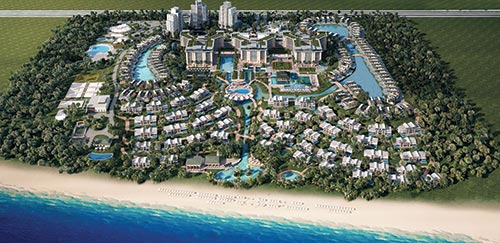Gencos lack attraction

Artist impression of the Alma Resort
“Many investors from China, Japan and Korea have expressed interest in becoming power generation company (Genco) shareholders,” said Cao Dat Khoa, director of EVN Capital Investment.
However, the reality is that there is no evidence suggesting any detailed negotiation between foreign investors and the Gencos thus far.
The group’s hope for local investors to pick up Genco shares has remained dim for a long time. There is little chance that local or foreign investors will put capital into the companies due to their poor financial status. “Hardly any local investor has shown sufficient capability or any kind of real interest in Genco stakes,” admitted Khoa.
The unattractiveness of the Gencos has been attributed to many factors, with their state-owned status as the leading cause, many experts have said.
Torbjorn Kirkeby-Garstad – vice president of Asia and Vietnam country manager of global hydropower producer SN Power told VIR, “One of the key reasons why SN Power has abstained from investing is the difficulties concerning at least 51 per cent state ownership.”
Under current regulations, foreign investors are allowed to purchase 49 per cent of listed companies and 30 per cent of those first entering the market through IPOs.
Also, the controlled power price is another discouraging aspect of the market preventing foreign and local capital from pouring in. There is no point for investors to get involved in a market where they have no influence over the selling price.
According to Tornjorn, a “market-based valuation” would be a catalyst for the restructuring of SOEs.
Another point worth mentioning is that experts have assessed that Gencos projects require sizable capital input but only produce modest revenues and return-on-equity. So far, the estimated charter capital of the Gencos is around VND40 trillion ($2 billion), while both intermediate and long-term profitability are expected to remain low.
A final issue with the Gencos is their limited liquidity, which has resulted in sluggish implementation of infrastructure. They have a bad financial reputation and therefore it has been difficult for them to attract new investment or be eligible for loans. The total debt of the Gencos is quintuple their initial equity, having reached VND160 trillion ($7.6 billion).
In an effort to deal with the current doldrums, EVN has launched wide-reaching measures that included restructuring debts, redesigning sales contracts and improving the transparency of its operations, but the results have yet to be seen.
What the stars mean:
★ Poor ★ ★ Promising ★★★ Good ★★★★ Very good ★★★★★ Exceptional
Latest News
More News
- State corporations poised to drive 2026 growth (February 03, 2026 | 13:58)
- Why high-tech talent will define Vietnam’s growth (February 02, 2026 | 10:47)
- FMCG resilience amid varying storms (February 02, 2026 | 10:00)
- Customs reforms strengthen business confidence, support trade growth (February 01, 2026 | 08:20)
- Vietnam and US to launch sixth trade negotiation round (January 30, 2026 | 15:19)
- Digital publishing emerges as key growth driver in Vietnam (January 30, 2026 | 10:59)
- EVN signs key contract for Tri An hydropower expansion (January 30, 2026 | 10:57)
- Vietnam to lead trade growth in ASEAN (January 29, 2026 | 15:08)
- Carlsberg Vietnam delivers Lunar New Year support in central region (January 28, 2026 | 17:19)
- TikTok penalised $35,000 in Vietnam for consumer protection violations (January 28, 2026 | 17:15)
















 Mobile Version
Mobile Version